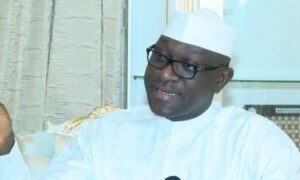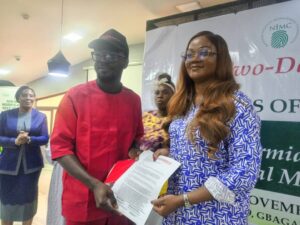
2023 Presidential election: Atiku, Tinubu unveil 4-year economic agenda for Nigeria
…As experts express mixed reactions on roadmaps to economic resuscitation
By Uthman Salami, Ridwan Adekunle and Joel Oladele
Having successfully won respective primaries and emerged as standard bearers of their political parties for the upcoming general elections, the two leading presidential candidates, Asiwaju Bola Ahmed Tinubu of All Progressives Congress (APC) and Alhaji Atiku Abubakar of the Peoples Democratic Party (PDP) have begun reeling out their economic roadmaps for Nigeria.
Following the unveiling of their 4-year economic agenda, some Nigerians who spoke with Nigerian NewsDirect expressed mixed opinions on the set agenda of the duo.
Mr Ismail Solagbade, a Data Analyst from Lagos lauded the agenda, especially decentralisation of police. He however, said the next president should be ready to face the challenges to be inherited from bad economic policies of the previous administration.
His words, “Decentralising police is key, I mean State police, Let each State has its own internal security apparatus v5 look beyond one source and explore other means for an improved power generation and distribution.
“15,000 MW is too small for a country like Nigeria, at least we need 40,000MW to drive our economy. We have enough sun for solar, water for hydro, and Gas for thermo.
“The distribution network of Discos is very bad and not encouraging at all. What is the usefulness of generating electricity but transmission and distribution networks are old and not useful. We need total transformation of our TCN, GenCos and Discos,” he urged
Also, Mr. Alabere Yakub, a Lecturer from the Department of Science Laboratory Technology (Chemistry option), Federal Polytechnics. Idah, Kogi state called for economic diversification.
According to him, that was the only way an improved economy could be achieved, otherwise, the agenda remains a mere wishful thinking as it has always been with the past leaders.
“First and foremost, promises are easier made than fulfilled. We have heard enough of these in the recent past and almost nothing came to fruition.
“Decentralisation of the policing system is key because those within a system are the ones that can identify their problem & possible solutions. When this is done it will create a robust security system where crimes will be easily identified & curbed.
On generation of power, Alabere said “Generation of power is useless without transmission & distribution to final consumers. 15MW power generation seems too meager when compared to our needs but one step at a time. The candidate should outline how this will be achieved.
“12 per cent growth annually in GDP is huge but achievable. When we look back & compare the growth of successive governments, you will agree with me that 12 per cent GDP growth is huge.
“There is great need for a road map of how this is going to be achieved because the economy drives the GDP. So with a mono & overdepended economy like ours I doubt the actualization of 12 per cent GDP growth annually.”
However, in a chat with Nigerian NewsDirect on Thursday, an Energy, Political Analyst, foremost Nigeria Bamboo Expert, Mr. Eleojo Joseph said the proposed agenda is unrealistic and he described it as another ploy to deceive the uninformed and ignorant.
According to him, the set agenda was only “a political statement to lure the uninformed and enlightened Nigerians. Bola Ahmed Tinubu did the same thing in 2015 and he is coming back with the same propaganda and falsehood again in 2023.
“Decentralisation of police has started in its crude form already with Amotekun and the rest. How does he want to go about it? He has to lay it bare.
“12 per cent GDP? How? With our broken infrastructure and non-existing infrastructure?
“15,000MW in a country of 200m people? He does not know the importance of electricity If he is looking at 15,000Mw only.
“He did say they will generate and transfer and send electricity to areas that need electricity.
“It shows he does not understand the dynamics with electricity for a country like Nigeria. It seems he is relying or looking at the existing structure of NERC (Nigerian Electricity Regulatory Commission), TCN(Transmission Company of Nigeria) and the rest unprofessional entities in the electricity sector,” he stated.
The presidential candidate of the APC, Tinubu, had in less than 24 hours after his landslide victory, revealed his manifesto for the transformation of the country if elected president in 2023.
In a statement signed by his Director of Media and Communication, Mr Bayo Onanuga, Tinubu promised that his team will lead the country to a new era of economic prosperity, peace, security and political stability.
On the restructuring of the police force, Tinubu planned to improve security by decentralising the policing system of the country and creating hundreds of thousands of new jobs simultaneously.
In an agenda titled ‘My Vision for Nigeria’, Tinubu promised in the document, “a nation transformed into greatness, the pride of Africa, a role model for all black people worldwide, and respected among all other countries.
“A vibrant and thriving democracy and a prosperous nation with a fast-growing industrial base, capable of producing the most basic needs of the people and exporting to other countries of the world. A country with a robust economy, where prosperity is broadly shared by all irrespective of class, region, and religion.
On the roadmap to revamping the shrieking economy, the APC flag bearer promised to build an economy that will strive to make the nation’s Gross Development Product (GDP) to grow rapidly annually with a target of 12 per cent for the next four years whilst creating jobs for millions of youths in the country.
According to the economic blueprint of Tinubu, a new National Industrial Policy that will focus on special intervention to rejig specific strategic industries would be launched.
“I will focus on stimulating jobs, which will be my top priority as President. I will get Nigeria to work by launching a major public works program, a significant and heavy investment in infrastructure, and value-adding manufacturing and agriculture,” he stated.
“My administration will build an efficient, fast-growing, and well-diversified emerging economy with a real GDP growth averaging 12 per cent annually for the next four years, translating into millions of new jobs during this period,” he said.
He said six new Regional Economic Development Agencies, which would establish sub-regional industrial hubs to exploit each zone’s competitive advantage and optimise their potential for industrial growth.
The presidential aspirant also promised to formulate a new National Policy on Agriculture to boost food production.
He promised to promote the establishment of new commodity exchange boards, while also strengthening the one in Lagos in order to guarantee minimum pricing for agricultural products such as cotton, cocoa, rice, soya beans, corn, palm kernel, and groundnuts.
He said his administration would promote the establishment of new commodity exchange boards, while also strengthening the one in Lagos in order to guarantee minimum pricing for agricultural products such as cotton, cocoa, rice, soya beans, corn, palm kernel, and groundnuts.
On infrastructure, Tinubu promised to “Build A New Nigeria (BANN)” by developing a National Infrastructure Plan, which will cover strategic roads, bridges, rail, water, power, seaports, and airports spanning the length and breadth of the country.
He said his administration will combine government funding, borrowing, public-private partnership, private sector financing and concession to initiate a medium and long-term financial model for the BANN initiative.
Tinubu further stated that his administration will target an electricity distribution goal of 15,000 megawatts across the country and ensure a sustainable 24/7 supply.
“On Electricity, I will embark on a renewed action-oriented focus and take immediate and urgent action on resolving existing challenges of power generation plants, gas purchasing, pricing, transmission, and distribution.
“My administration’s critical goal is to have 15,000 megawatts distributable to all categories of consumers nationwide to ensure 24/7 sustainable supply within the next four years,” he added.
On the oil and gas sector, Tinubu said there would be no need for a subsidy because the market will be open and transparent.
“Supply will come from local refineries, and the forces of demand and supply will determine the price of petroleum products.”
My administration will establish a National Strategic Reserve for Petroleum Products to stabilise supply during unexpected shortages or surplus periods. This will eliminate any form of product shortages and prevent wild swings in prices.
Tinubu also spoke about his administration’s promise in the area of education, promising to increase the spending on education to 25 per cent of the nation’s budget.
He promised to continue the free school-feeding programme of the APC, feeding “millions of primary school children across the country.”
On tertiary education, Tinubu said his administration would nip in the bud the incessant strikes by tertiary institution workers by encouraging the tertiary institutions to source funds through grants and corporate sponsorships, with all the institutions granted financial autonomy.
The APC presidential candidate promised to increase the funding for health care in the annual budget to 10 per cent. According to him, the National Health Insurance Scheme will be relaunched to grant health insurance cover to most Nigerians.
… I will restore Nigeria’s unity through equity, social justice, cooperation — Atiku
While the former Vice President, Atiku Abubakar was expressing his agenda released on his Twitter page on Thursday titled, ‘The three guiding principles of my economic agenda’, he promised to tackle insecurity, economic and other challenges bedeviling the country.
He said his first agenda was to “Restore Nigeria’s unity through equity, social justice, and cooperation.”
Others are “establish a strong and effective government that guarantees the safety and security of life and property.
“Build a strong, resilient, and prosperous economy that creates jobs and lifts people out of poverty
“Promote a true federal system which will provide strong Federal Government to guarantee national unity while allowing the federating units to set their own priorities
“Spearhead education reform so it is driven by innovation, science, and technology.”
He said his three agenda revolve round tripod principles, which include, “Reaffirm the criticality of private-sector leadership and greater private sector participation in development, while repositioning the public sector to focus on its core responsibility of facilitation and enabling the appropriate legal and regulatory framework for rapid economic and social development.
“Break government monopoly in all infrastructural sectors, including the refineries, rail transportation and power transmission and give private investors a larger role in funding and managing the sectors, thus emulating the benefits accrued in the oil and gas and telecom sectors.
“Allow the market greater leverage in determining prices. This way we shall eliminate the persistent price distortions occasioned by current interventionist exchange rate management policy. Government intervention, where absolutely necessary, will be done responsibly and judiciously.”



